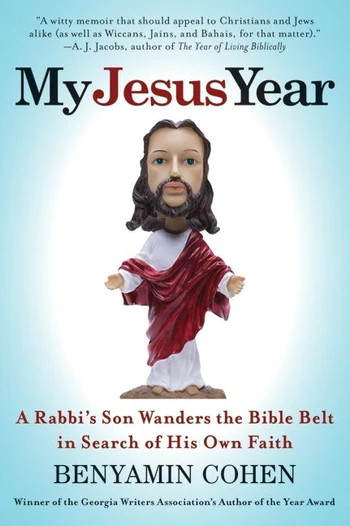My Jesus Year: A Rabbi’s Son Wanders the Bible Belt in Search of His Own Faith is a humorous and sometimes insightful look into the smorgasbord of Christian religions in the United States.
Benjamin Cohen, a journalist and a Jewish observer, ventures into Christian wrestling, Catholicism, Anglicans, Mormons, Christian mystics, and more, including some off the beaten-track.
Cohen mixed two genres. His book came out almost the same time as A. J. Jacobs hilarious book, The Year of Living Biblically: One Man’s Humble Quest to Follow the Bible as Literally as Possible. Although Cohen is trying to write from a neutral journalist position, there are many allusions to his Jewish roots. His book also follows in the footsteps of the Israeli-American author Zev Chafetz, A Match Made in Heaven: American Jews, Christian Zionists, and One Man’s Exploration of the Weird and Wonderful Judeo-Evangelical Alliance. Chafetz, who worked under the legendary Israeli Prime Minister, Menachem Begin combined humor and insight from a contemporary American-Israeli perspective. Cohen displays his from an American-Jewish one .
The author had the opportunity to explore the bigger metaphysical questions on why humanity reaches towards the heavens. Why do cultures and communities desire to reach out to an immaterial realm? Is it innate in us? Is there a God? Who is that person? What is the best way? He was able to ask these questions but only lightly touched on them.
He gives some indication of his metaphysics while dealing with a strange Christian movement where he rationalizes that we are all subconscious inheritors of traditions, language, and customs from our families of origin:
It all feels a little cultish, but who am I to judge? As an observant Jew, I do weird things too. I walk in the rain, sans umbrella, on the Sabbath. (Pg. 105)
And then an overarching statement towards the end:
No one group holds the copyright on a connection with God. Not the Catholics. Not the Episcopalians. Not the Baptists. And not the Jews. (Pg. 208) …I’m not a Baptist or an evangelical. I am a simple Jew seeking to find God. And that’s a perfectly fine path for me to take.” (Pg. 209)
His journey into the Charismatic/Pentecostal realm had my attention, as this genre is a recurring theme in many of my religious studies. The first highlight was his critical response to a Christian worship leader who said God personally spoke to her during the service to choose a Bible verse:
At synagogue if a verse starts speaking to someone, we kindly escort them to Dr. Steinberg, the resident psychologist. It’s a bit odd to see the church’s prayer choices being dictated by a girl who’s not even legally allowed to vote. (Pg. 87)
…Although in Jewish tradition we can speak to God through prayer and supplication, we don’t believe that God converses directly with mere mortals. (Pg. 88)
And then, on miracles, he takes a deist perspective. “In Jewish tradition, the Almighty, the rabbi explains, only performs miracles within the confines of nature.” (Pg. 217) “…God designed the world to run within a natural law.” (Pg. 219)
He corroborates with public perception of faith healers, “They are merely earthly manifestations of people hijacking religion for their own purposes,” (Pg. 220) and then spins it to a more positive tone, that even though there is a pedaling of false hope, it is still hope (Pg. 221).
He agreed that many churches are fixated only on the saving relationship with Jesus.
“Accept Jesus into your life and everything will be okay. That’s all folks.” (Pg. 90)
He heard many rags to riches testimonies and wondered “if a bad beginning is necessary for a happy ending in a Christian life.” (Pg. 157) This impression also resonates with many in the Christian community and in need of correction.
Cohen paints a comedic picture of the two faiths overlooking the tensions and problems as if the challenges are minor. The intersection between Christianity and Judaism is complex and sometimes difficult. Many Jewish observers are suspicious of the much larger and omnipresent Christian community that, on the one hand, is Anti-Semitic, and on the other, Charismatic and Pentecostal circles, Philo-Semitic.
For more information on Christian Zionism, see my articles on Pentecostals and Israel, The Journey Out of Christian Zionism, and The Alliance between Israel and Evangelicals.
I am a researcher on the various facets of historical Christianity, which led to a brief sojourn of life in Israel, any book by Jewish writers looking at North American Christianity is an invitation for further query.
Amid Pentecostal or Charismatic gatherings where the subject of Jewish—Christian relations begin, I would recommend this book as a good starting point. The works by Zev Chafetz in this genre is a little higher on my ratings chart.
The book used for the review states, uncorrected proof not for sale. How this older book came into my possession, I do not know. The final version may be different than this one.
